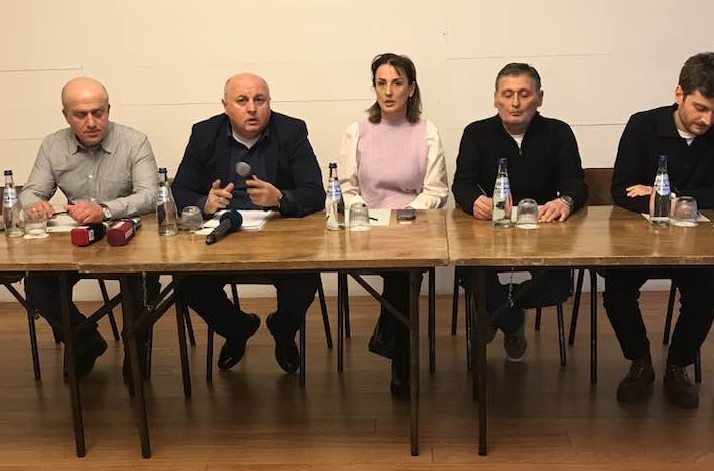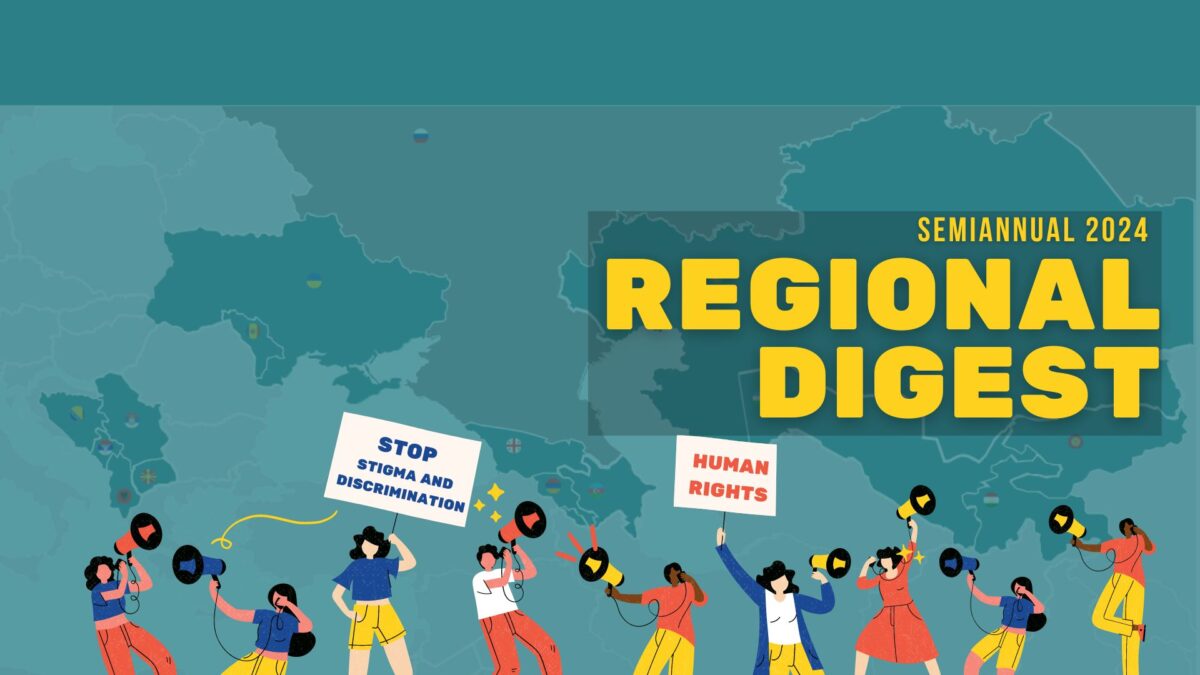Introduction
According to REAct data over 27,000 cases of human rights violations, discrimination, and stigma against key vulnerable communities have been registered in 14 countries in Eastern Europe and Central Asia since 2019 until 30th of June 2024.. Every second person who uses psychoactive substances has been denied medical services, with one in ten of them being denied in emergency situations. Over 50% of sex workers report physical violence, with every second one reporting sexual violence, and every third suffering from offenses committed by law enforcement agencies. Every member of the LGBTIQ community has faced hate speech at least once, and over 50% have experienced physical violence, with every third being a victim of their own relatives. People living with HIV have encountered discrimination due to their HIV status in medical institutions at least once. Every fifth person has faced the disclosure of their HIV status by medical workers.
Armenia
In 2024, an increase in the number of cases of human rights violations by the police was recorded in Armenia. Since the start of the anti-drug campaign announced in 2023, people from vulnerable groups have periodically reported intimidation and threats, as well as abuse of power, excessive use of force, and unauthorized searches. This is particularly common among sex workers and members of the LGBTIQ+ community.

For example, earlier this year, a sex worker and a representative of the LGBTIQ+ community were detained late at night in a park in his city. He was approached by two men who identified themselves as police officers. They searched, demanding to see his pockets, bag, and the last used app on his phone. The law enforcement representatives explained that there were many people using drugs in the park and the detainee, in their opinion, could be one of them. Further, the police read the man’s correspondence in Telegram, subjected him to humiliation, and mockingly ordered him to leave the park and walk outside the city where “people like him” gather.
In another case, a man who met a man in an LGBTIQ+ group on Telegram became a victim of theft after their first meeting. But when he went to the police, he faced no help but insults. During interrogation, he was accused of not serving in the army and mocked for his HIV-positive status. It was only thanks to the help of the REActor that the pressure on the man stopped, his application was accepted and an investigation into the case began.


A client of another national REActor described the case of a friend of his who admitted to drug use to a nurse while undergoing tests before an operation. She immediately informed the relevant authorities and two police officers arrested the man, who had not even had time to leave the building of the medical center. After that, communication with him ceased.
Such cases undermine trust in medical personnel and infringe on the rights of patients. Violation of confidentiality and ethical norms, as well as undue police interference, require immediate attention and resolution at the state level in Armenia. Instead of persecution, people from key populations should be provided with relevant assistance, support, and protection of their rights.
Azerbaijan
In Azerbaijan, special attention should be paid to the assistance provided by REActors in obtaining opioid substitution therapy (OST) and documentation in the absence of residence or registration for members of the community of people who use drugs. Clients are informed about their rights and treatment options depending on their current situation, including possible barriers and ways to overcome them, accompanied to medical facilities, and helped to make appointments. And in the case of legal aid, assistance with specialist advice on the paperwork required to access medical care.

One client, after the tragic death of her lover, decided to stop using drugs and turned to the REActors for help. She was helped to register, access OST at the Republican Narcology Center, and stabilize her condition.
REActors also continue to document cases of denial of access to medical services and HIV-related discrimination. One situation occurred when a client went to a dentist. After taking measurements and making an advance payment, the dentist said the onlay would be ready in a few days. When the client returned to finish what he had started, the dentist refused to do his work. The reason turned out to be the man’s positive HIV status, which he had mentioned at the first appointment. Attempts to return the money were ignored and the client was kicked out of the office. In desperation, the man appealed to the national REActors of Azerbaijan to seek justice and draw attention to the problem of discrimination in medicine.


REActors’ assistance continues in protecting the rights to privacy and freedom from discrimination. A 20-year-old student faced prejudice and discrimination because of his sexual orientation, realized at the age of 15. Fearing for the reaction of his elderly parents, he tried to hide his secret. However, when a classmate learned the truth and threatened to reveal it, the boy turned to a REActor for help. The lawyer to whom the student was referred arranged a meeting with the blackmailer. During the conversation, the lawyer explained the consequences of such behavior and mental abuse, which made the classmate apologize and promise to respect the client’s privacy.
Georgia
Since the beginning of the year, the situation in Georgia remains extremely worrying. The law on “foreign agents,” finally adopted in Georgia on May 28, poses a serious threat to access to treatment and medical and social services. It imposes strict restrictions on the activities of media and public organizations that receive funding from abroad, requiring them to register as “foreign agents”. The law directly affects many NPOs that play a critical role in providing services to key groups in the country and often depend on foreign funding to implement their programs and projects. The introduction of additional bureaucratic hurdles and potential sanctions, such as fines of several thousand dollars, will deter these organizations, reducing their ability to assist:
– Evasion of registration as an organization carrying out the interests of a foreign power or failure to submit the financial declaration stipulated in Article 6 of this Law within the term established by the same article – shall entail a fine of 25,000 GEL ($8,850).
– Failure to fulfill the requirement of Article 4, paragraph 2 of this Law, failure to fulfill the obligation to eliminate the deficiency stipulated in Article 4, paragraph 4 or Article 6, paragraph 1 of this Law or the declaration specified in Article 4, paragraph 1 of this Law. Article 8, paragraph 5 of this Law Failure to fulfill the obligation to complete and submit – shall be punishable by a fine of GEL 10,000 (USD 3,540).
– Continuation of the action provided for in paragraph 2 of this Article within 1 month from the date of imposition of the last administrative fine for the same action – shall entail a fine of GEL 20,000 (USD 7080).
– Failure to provide the person authorized by the Ministry of Justice of Georgia with the information requested by him/her by this Law – shall entail a fine of GEL 5,000 (USD 1,770).
In addition, the regulations requiring registration with the National Agency of Public Registry of the Ministry of Justice create an atmosphere of mistrust and fear, which may lead to a decrease in the number of organizations willing to work in Georgia. This, in turn, will limit access to services, especially in remote and low-income areas where the work of such organizations is vital.

Recent changes to the Department of Health order have also made significant adjustments to the opioid substitution therapy (OST) program. Under previous rules, patients could receive a two-day dose of medication if they were unable to visit a healthcare facility and a family member or other authorized person could pick it up for them. However, patients or their authorized representatives must now visit OST sites daily.
The changes also affected the ability to provide pharmaceuticals in special cases. Previously, patients could receive a five-day supply of medication for long-term home treatment or a seven-day supply for those with severe disabilities or active TB. These exceptional regulations have been abolished. Now, even in the case of travel or ill health, patients may be given only a one-day dose.
Drug policy organizations, health experts, and public associations expressed alarm at these changes, believing that they would not adequately protect the rights of patients participating in the program. In this regard, a public appeal of Georgian NGOs to the Ministry of Health was prepared.
Also, in late March, the ruling party proposed constitutional amendments that would restrict LGBTIQ+ rights. If the constitutional amendments are passed, any LGBTIQ+-related gatherings would become illegal. The legislative initiative would also ban same-sex marriage, sex reassignment, and adoption of children by same-sex couples.
State-level proposals and changes such as these not only restrict civil liberties but also significantly impede critical services that could have irreparable consequences for the health and quality of life of both key groups and the general population in Georgia as a whole.
Kazakhstan

In Kazakhstan, there are problems related to the violation of the rights of key groups, in particular people living with HIV and viral hepatitis C. Reactors have documented cases of denial of treatment due to lack of mandatory social health insurance (MSHI), despite hepatitis being recognized as a socially significant disease, and medical professionals often disclose patients’ HIV status, violating their confidentiality.
In one case, a woman living with HIV faced a violation of her rights when trying to take a trip to a sanatorium, where the staff demanded a certificate from the AIDS Center, which would have forced her to disclose her HIV status. In response to the unlawful actions of the sanatorium, the REActors filed a complaint with the Public Health Department.


In another case, a woman, also living with HIV, faced denial of medical care for increasing symptoms of depression. She was denied access to a psychotherapist and necessary medication, which is discrimination based on her HIV status. In response, REActors prepared a complaint to primary health care.
In one of the hospitals, nursing staff were instructed to put bracelets on patients with personal data, including HIV status. Following a complaint sent by REActor to the chief physician, the confidential information from the bracelets was removed and the head of the department, who had many previous violations, was fired.


Representatives of key groups also face dismissal or denial of employment. A woman participating in a substitution therapy program obtained a job as a packer at a household goods firm through an outsourcing company but was denied permanent employment because she participated in the program. After seeking REActor’s help, the employer agreed to hire her permanently, and the Department of Labor and Social Protection began an inspection of the outsourcing company.
The situation with the LGBTIQ+ community is also alarming, with increased police raids on closed LGBTIQ parties, harassment, and threats against activists. One student, an LGBTIQ+ activist, faced cyberbullying and threats of violence from another student who posted abusive messages under an anonymous Telegram nickname. To protect his rights, he sought help from REACTors, who filed a complaint with the university.

The situation in Kazakhstan requires significant efforts to improve the legal environment and reduce risks for members of key groups.
Kyrgyzstan
On March 14, 2024, the Kyrgyz Republic adopted a new law “On Non-Profit Organizations”, which was signed by the President of the country on April 2, 2024. This law introduced a new concept – “Non-profit organization performing the functions of a foreign representative”. This is an NPO established in the Kyrgyz Republic, which receives funds and other property from foreign states, their state bodies, international and foreign organizations, foreign citizens, stateless persons, or persons authorized by them who receive funds and other property from these sources (except for open joint-stock companies with state participation and their subsidiaries), and which participates, including in the interests of foreign sources, in political activities carried out on the territory of the Kyrgyz Republic. The law defines the political activities of non-profit organizations to include:
- Participation in the organization and holding of public events (meetings, rallies, demonstrations, marches, picketing) and public debates, discussions, and speeches.
- Activities aimed at obtaining a certain result in elections, referendums, observation of their conduct, formation of election commissions, as well as activities of political parties.
- Public appeals to state bodies and local self-government, affecting their activities, including the adoption, amendment, or repeal of laws and regulations.
- Dissemination of opinions about the decisions of state bodies and their policies, including the use of modern information technologies.
- Formation of socio-political views and beliefs through public opinion polls and sociological research.
- Involvement of citizens, including minors, in these activities.
The adoption of the new law had a significant impact on the functioning of REAct in the country. Since the beginning of the year, the work of the system has been suspended.
Moldova

At the end of the first quarter of 2024, there were three cases registered in Moldova when law enforcement officers were the first to arrive when an ambulance was called for people who use psychoactive substances. To prevent this partial practice from becoming a trend, REActors decided to engage a professional lawyer to handle these situations.
Also, since 2024, the team of specialized paralegals in Moldova has increased significantly, with the number of staff growing from 10 to 32. This expansion includes not only specialists providing HIV services but also those working in the field of tuberculosis. All paralegals use the REAct database to document and respond to cases of human rights violations. This improves the monitoring and resolution of legal issues at the community level. Due to the expansion of the paralegal network and new trends in the development of the Legal Cascade* In Moldova, all paralegals have become REActors.
*The Legal Cascade is an algorithm by which paralegals work with clients:
– Initial screening: human rights violations are assessed using the Harm Reduction Implementers’ Reporting System (1S).
– Mediation and sensitization: if a client needs mediation or sensitization about their rights, their case is resolved and documented at the national level in the SIA CNAJGS database.
– Documentation and response: if a rights violation and discrimination has been identified, the case is documented in the REAct database and a direct response to the violation is conducted.
Tajikistan
The situation faced by human rights defenders and some vulnerable communities in Tajikistan is of some concern. Recent developments point to a growing trend of restrictions on civil liberties and discrimination against the LGBTIQ community. The last two years have seen an increase in threats against human rights defenders in Tajikistan. Falsified cases under Articles 238, 239, and 241 of the Criminal Code are used as tools for harassment, resulting in activists being unjustly imprisoned. The use of personal photographs obtained through illegal searches to fabricate cases constitutes a serious violation of the right to privacy and fair process. For example, the most recent openly operating health care provider for the MSM (men who have sex with men) community, the NGO Equal Opportunities, was subjected to inspections, threats, and attacks on its office. Despite filing police reports, attempts at legal defense, and support from international donors, the organization’s activities were halted by a court ruling because: “the organization promotes sex services for men, which contradicts the moral norms of the country.”
Fear of discrimination and harassment leads MSM and trans community members to hesitate to seek necessary services, including HIV testing and prevention. In addition, the reluctance of lawyers to represent LGBTIQ individuals in criminal cases further exacerbates their vulnerability and denies them access to justice.

Also, violence against women remains an acute social problem. To improve the situation, an expert was engaged to achieve strategic changes, legislative amendments, or procedures to prevent violations documented in the REAct system.
As a result, measures were proposed to improve the situation, including advocacy to improve access of women from vulnerable groups to shelters after cases of domestic violence and to organize low-threshold service centers in NGOs to reduce stigma and discrimination. It was also recommended to conduct information campaigns, trainings, and working meetings for employees of public services and NGOs involved in the prevention and identification of cases of violence. A Memo for employees of social service centers assisting victims of domestic violence and people in difficult life situations was developed. This document was approved at the level of the Ministry of Health and Social Protection of Tajikistan and by the Department of Sanitary and Epidemiological Surveillance for application for social service centers.
National REActors continue to work actively to help vulnerable groups of the population. In one case, a 46-year-old man living with HIV, a member of the community of people who use drugs, approached the REActors. His family had isolated him for fear of infection. The man asked to speak to his family to dispel myths about HIV and explain the importance of treatment. The REActor provided information about therapy and asked the family to support the man. As a result, their attitudes changed and the client started taking ART (as he also had preconceptions about treatment before).


In another situation, a REActor provided psycho-emotional and legal support to a woman living with HIV who was deported for violating the laws of another country. She did not leave the country within the deadline and was working illegally, which could lead to a lifetime deportation. She was also offered further psychological support and ways to resolve legal issues related to her status and future employment.
Ukraine
A large number of reported cases concerned violations of the rights of people from vulnerable groups by medical workers of state institutions. In most cases, the violation of rights was accompanied by stigma and discrimination because of belonging to a risk group.

In one situation, a client went to a vascular surgeon who referred her for an ultrasound of her lower extremities. At the hospital, the nurse refused to do the ultrasound, citing the HIV diagnosis on the referral. The doctor rudely confirmed this, stating that healthcare providers should know who they are working with. The client contacted the REActor, where she was explained her rights, offered assistance in writing a complaint, and organized an escort to the Regional Hospital, where she received the necessary treatment.
Both in 2023 and 2024 there are cases of obstetric violence against women living with HIV. For example, a client went to a gynecologist because of lower abdominal pain and learned about her positive HIV status in an incorrect form. The doctor strongly recommended terminating the pregnancy, claiming that the child would be born sick. The stress caused her to bleed, and the hospital where she was taken hinted at a bribe. After finding REActors, she received support from a social worker, and HIV counseling, was registered, and received ART therapy. She was also offered the help of a psychologist and a lawyer and continues to receive psychological counseling and therapy.


Due to discriminatory attitudes, people from vulnerable groups lose the opportunity to timely detect serious life-threatening diseases. In particular, one client complained about an oncologist who refused to provide medical services because of her HIV-positive status, advising her to go to an AIDS center. The REActor discussed the situation with the deputy chief physician, who agreed with the violation and had a discussion with the oncologist. The client was booked for a follow-up appointment, where she received the necessary examination and treatment.
The issue of reducing the level of stigma and discrimination among the police towards people from vulnerable groups remains relevant (in terms of the number of recorded cases of rights violations, it is the representatives of law enforcement agencies who are next to medical personnel). In 2024, situations are recorded when patients of substitution maintenance therapy programs are stopped and deprived of medications, even in the presence of all supporting documents and certificates of SMT program participants.

Uzbekistan
According to the data registered in the REAct database, in 2024, Uzbekistan recorded serious problems related to violations of the rights of people living with HIV and key populations. The collected cases indicate that the most frequent violations come from representatives of state structures, family members, medical institutions, and the workplace.

Thus, state bodies that should ensure support and protection of the rights of PLHIV and key groups, often demonstrate discriminatory behavior. This is expressed in the form of denial of social assistance, stigmatization, and violation of confidentiality. Community members often find themselves in difficult life situations without the necessary support.
Healthcare providers sometimes deny or provide insufficient care to PLHIV and key groups. Patients often face disclosure of confidential information about their HIV status, leading to further social isolation and discrimination.


Colleagues in the workplace may display hostile attitudes towards PLHIV, leading to conflict, bullying, and wrongful dismissal. Disclosure of an employee’s HIV status is often a cause of professional discrimination and a barrier to growth.
However, significant positive steps at the highest levels of government should be noted: recent changes in Uzbekistan’s labor legislation open new opportunities for people living with HIV. Thanks to the efforts of REAct partners and the political will of the authorities, the list of professions prohibited for people living with HIV has been revised. The order of the Ministry of Health, which came into force on February 19, 2024, will allow many to support themselves and their families, supporting financial independence and social development.
Balkan region
Albania

In 2024, Albania’s national REActors made significant progress in their efforts to protect and support the human rights of key populations. An operational plan to register cases in the REAct system was successfully implemented and two separate consultants were appointed to manage the process. Round tables were held for NGOs and representatives of key groups to discuss challenges in implementing human rights protection measures. Four strategic cases were recorded, three of which were resolved positively and one is still pending.
Nevertheless, some challenges remain. Strong stigmatization continues to prevent people from reporting human rights violations, and fear of retaliation prevents many from reporting to the police. Insufficient funding and human resources limit the capacity to support reported cases. Lack of trust in institutions also hinders reporting and cooperation.
Key findings of the study point to the ongoing need for advocacy and support for people living with HIV (PLHIV) and members of the LGBTIQ+ community. Unauthorized disclosure of HIV status by medical personnel remains an acute problem, along with discrimination based on sexual orientation and gender identity, which affects LGBTIQ+ people in a variety of ways, including termination of disability payments by social state institutions, loss of employment due to disclosure of HIV status, and denial of access to health services.
The immediate plans of Albania’s national REActors include developing a work plan with clear goals, timelines, and measurable outcomes, and collaborating with NGOs and affected people to obtain quality information. Also, facilitating discussions on human rights issues with politicians and community leaders, advocacy for policy change, and building alliances with human rights organizations.
Bosnia and Herzegovina
In 2023, the President of Republika Srpska (part of Bosnia and Herzegovina) announced the imminent adoption of a law on foreign agents. It could oblige all local NGOs receiving foreign funding to declare their financial transactions and activities, following the Russian and Georgian models. Attempts to adopt such a law had been made since 2015, but under public pressure and external factors, the authorities abandoned these plans. On May 28, it became known that the government still withdrew the bill on “foreign agents” from Parliament this time as well. The decision was announced by the Minister of Justice and deputy Prime Minister, but he did not give the reason. And although this issue has been closed, it should be understood that it may not last long. The adoption of such a law can seriously affect the programs of service providers and human rights organizations, as it significantly complicates their work, requiring additional reports and creating an atmosphere of distrust. This could lead to a reduction in foreign funding and services, and therefore negatively affect support for vulnerable groups, depriving them of those most in need.

For example, discrimination and stigmatization of people with HIV remain a serious problem in Bosnia and Herzegovina: social rejection and prejudice lead to human rights violations and limited access to health services. REActors documented a case in which a client living with HIV was unfairly excluded from work without explanation, despite medical certificates stating that he was fit to work. He was provided with legal aid and support to help him fight the unlawful dismissal, but it remains clear that this is not an isolated situation.
Another case was received from a couple who faced bureaucratic obstacles and stigma because of the woman’s HIV-positive status (the authorities cited public health concerns about it). But despite the problems with obtaining a residence permit and discrimination, they were not afraid to seek legal assistance from REActors and are seeking restoration of their rights.

Montenegro
In 2023 and early 2024, REActors in Montenegro often faced client complaints related to the shortage of medical staff and the inability of the health system to meet the needs of many people from vulnerable communities. A critical issue was the lack of ART, leaving patients without life-saving treatment.

For example, earlier this year, REActors received a complaint from a man about a significant delay in receiving needed treatment despite following protocol for pre-ordering therapy. The client was deprived of ART for more than ten days, revealing serious deficiencies in the medical system. REActors responded by informing him of his rights, investigating the reasons for the delay, and advising the client to make a formal complaint to the Ombudsman. This incident highlighted the need for strict adherence to medical protocols and effective communication within the health system.
Another major issue was the challenges associated with the Opioid Substitution Therapy program (OST). Earlier in the year, another client reported insufficient psychological counseling within the OST program. The man’s main complaints related to infrequent and brief sessions with the psychologist, as well as the distracting environment in the crowded waiting room. In response, REActors contacted the mental health clinic to address these concerns and offered the client access to their counseling center, providing a better environment for psychological support.

REActors in Montenegro strive to create a more favorable environment for people to seek help and solve their problems, as many of the clients are unaware of their rights and do not know how to act in situations where their rights are violated. The fear of stigmatization associated with discussing personal problems also remains a significant barrier to seeking help. Reactors are focused on finding effective strategies to promote the rights documentation system itself and to expand their services to provide timely and adequate support to community members.
Northern Macedonia
In 2024, REActors’ analysis revealed alarming trends of discrimination and human rights violations, particularly against people living with HIV (PLHIV). Recorded referrals highlight systemic problems in health facilities where PLHIV face insurmountable barriers, such as inappropriate disclosure of their HIV status and denial of necessary health services. This systemic discrimination often forces PLHIV to go to separate health facilities, maintaining stigma and preventing them from receiving comprehensive health care.

One example is a hospital employee whose HIV status was disclosed without his consent, resulting in discrimination at work and denial of medical care. Despite initiating antiretroviral therapy, he faced prolonged exclusion until intervention by REActors ensured his return to work and an end to discriminatory practices.
In another case, a man living with HIV who needed a colonoscopy due to chronic gastritis was denied the procedure at a gastroenterohepatology clinic solely because of his HIV status. Despite maintaining an undetectable viral load through ART, he was referred to an infectious disease clinic that did not provide the necessary procedure.

To address these challenges, REActors in Northern Macedonia have developed comprehensive initiatives. These include educating healthcare providers through training, raising public awareness to combat stigma and misconceptions about HIV, and providing legal support to effectively combat discriminatory practices. Through advocacy for systemic change and strengthening the rights of PLHIV, REActors seek to create a more equitable healthcare environment where all people are treated with dignity and impartiality, regardless of their HIV status.
Serbia
Significant progress has been made in Serbia over the past three years. Three national REActors have started work and the REAct system has been presented at two national HIV conferences. A successful lawsuit was filed against two individuals accused of disclosing personal and family information, resulting in the completion of the trial and two verdicts. Notably, 28% of cases were favorably resolved, 17% were pending, and there were two success stories and two strategic cases. A total of 46 cases were disposed of, with 11 in 2022, 24 in 2023 and 11 in 2024.
Despite these achievements, some challenges remain. Clients who report rights violations often need urgent support, including legal and psychological assistance, but there are insufficient financial resources to provide these services. In addition, motivating people to report human rights violations remains a challenge, as well as combating discrimination by the institutions that are supposed to protect citizens.
Key findings show that the highest number of reported human rights violations are related to HIV status and LGBTIQ+ issues, with the number of violations of LGBTIQ+ rights increasing. In addition, there is a notable inconsistency in Serbian laws, such as anti-discrimination and criminal laws. Many reported cases involve psychological violence, hate speech, threats, and harassment. Another acute problem is the increase in violence against women and femicide; however, women rarely seek help.
In the future, national REActors plan to strengthen advocacy work among key populations through the media and social networks, strengthen cooperation with organizations that can provide much-needed legal and psychological support, organize training on how to recognize human rights violations and how to protect against them and advocate for increased support for key populations.


